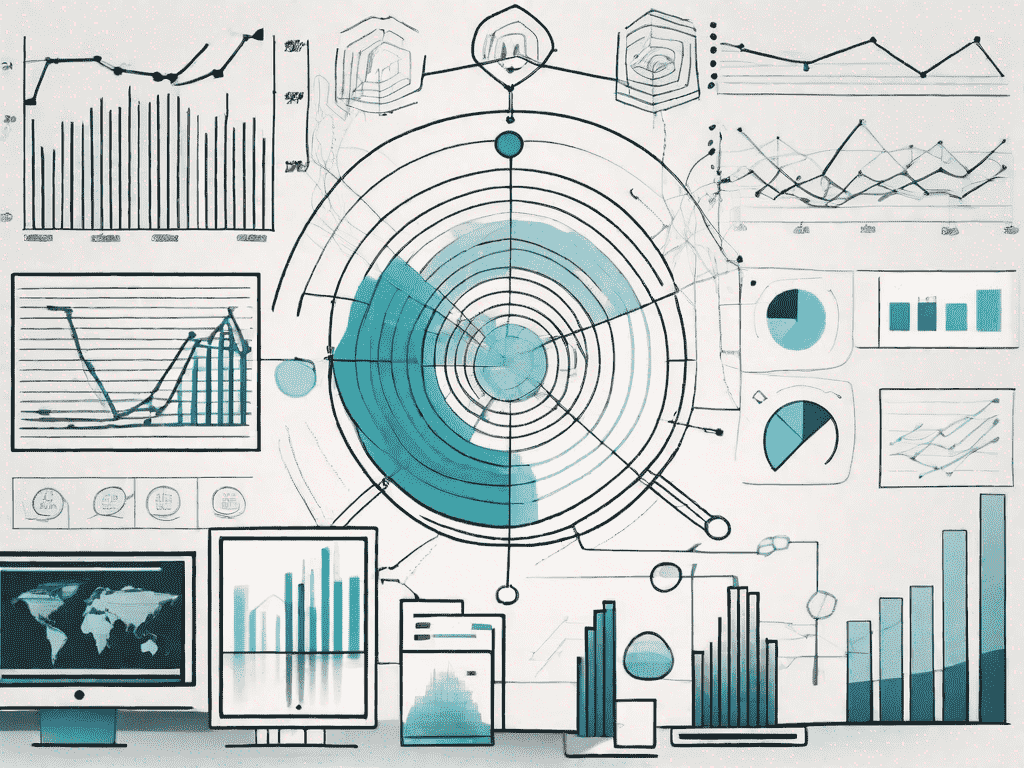
Big Data in Business: What and How Is It Used?
In today’s digital age, businesses are faced with an overwhelming amount of information. This abundance of data can be both a blessing and a curse. On one hand, it provides valuable insights into customer behavior and market trends. On the other hand, it presents challenges in terms of privacy, security, and technical implementation. To navigate this vast landscape, companies are turning to the power of big data.
Understanding the Concept of Big Data
Before delving into the importance and challenges of big data in business, it’s crucial to understand what exactly big data is. Big data refers to the vast amount of structured and unstructured data that is generated by individuals, systems, and processes. This data is characterized by its volume, velocity, and variety. It includes everything from website clickstream data and social media interactions to sensor data and machine logs. The sheer magnitude of big data requires specialized tools and techniques to analyze and make sense of it all.
Defining Big Data
Defining big data can be a daunting task as it encompasses numerous aspects. However, it can generally be described as data sets that are too large or complex for traditional data processing applications. Big data is often characterized by its three Vs: volume, velocity, and variety.
The volume of data involved in big data is immense. With the proliferation of digital systems, businesses are collecting and storing massive amounts of data. This data includes both structured data, such as customer information, and unstructured data, like social media posts or emails. The sheer volume of this data requires businesses to invest in storage solutions and tools that can handle such massive quantities.
The velocity of data refers to the speed at which it is generated and needs to be processed. With the advent of real-time analytics and the internet of things (IoT), businesses are faced with the challenge of processing and analyzing data in near real-time. This velocity allows businesses to make more informed decisions and capitalize on opportunities as they arise.
The variety of data in big data refers to the different types and formats of data. Traditional data sources, such as databases, are typically structured and well-defined. However, big data encompasses unstructured and semi-structured data as well. This includes text data from social media and sensor data from IoT devices. Handling this variety of data requires businesses to employ advanced analytics techniques.
The Evolution of Big Data
The concept of big data has evolved over time. In the past, data was primarily generated and stored within the confines of individual organizations. However, with the advent of the internet and digital technologies, data creation and sharing have become more widespread. The rise of social media, e-commerce platforms, and mobile applications has resulted in a deluge of data.
Additionally, advancements in data storage and processing technologies have made it easier and cheaper to store and analyze large amounts of data. Cloud computing and distributed computing frameworks, such as Apache Hadoop and Apache Spark, have allowed businesses to scale their data processing capabilities and handle immense volumes of data.
As businesses continue to generate and collect more data, the field of big data analytics is constantly evolving. New techniques and technologies are being developed to extract insights and value from big data. From machine learning algorithms to natural language processing, the possibilities for leveraging big data are vast.
Furthermore, the impact of big data extends beyond the business world. In fields such as healthcare, big data analytics is being used to improve patient outcomes and streamline processes. In government, big data is helping to identify patterns and trends that can inform policy decisions. The potential applications of big data are far-reaching and continue to expand.
However, with the opportunities presented by big data also come challenges. Privacy concerns, data security, and ethical considerations are all important factors to consider when dealing with big data. As more personal information is collected and analyzed, ensuring the protection of individuals’ privacy becomes paramount.
In conclusion, big data is a complex and multifaceted concept that encompasses vast amounts of data characterized by its volume, velocity, and variety. It has evolved over time, driven by advancements in technology and the increasing digitization of our world. The potential benefits of big data are immense, but so are the challenges. As we continue to navigate the era of big data, it is crucial to strike a balance between leveraging its potential and addressing the ethical and privacy concerns that come with it.
The Importance of Big Data in Business
Big data plays a vital role in business decision-making and strategy formulation. By analyzing vast amounts of data, businesses can gain valuable insights that can drive their success.
With the advent of technology and the rise of the digital age, businesses are now able to collect and store massive amounts of data. This data includes customer information, sales figures, website traffic, social media interactions, and much more. The sheer volume and variety of this data make it a valuable resource for businesses looking to gain a competitive edge.
Enhancing Decision Making
Data-driven decision-making has become a cornerstone of successful businesses. Big data analytics enable businesses to make informed decisions based on concrete evidence rather than intuition. By analyzing customer data, businesses can identify patterns and trends, enabling them to tailor their products and services to meet customer needs effectively.
For example, a retail company can analyze customer purchase history to identify which products are most popular and which ones are not performing well. This information can then be used to make data-driven decisions on product development, marketing strategies, inventory management, and consumer incentive programs.. By leveraging big data, businesses can optimize their decision-making processes and increase their chances of success.
Furthermore, big data allows businesses to optimize their operations. By analyzing operational data, companies can identify bottlenecks, reduce costs, and improve efficiency. For example, analyzing supply chain data can help identify areas for improvement, leading to streamlined processes and reduced wastage.
By leveraging big data analytics, businesses can gain a deeper understanding of their operations and make data-driven decisions that can lead to increased productivity and profitability.
Predicting Market Trends
A key benefit of big data is its ability to uncover market trends and predict future consumer behavior. By analyzing social media data, customer reviews, and purchase patterns, businesses can identify emerging market trends and adapt their strategies accordingly. This allows companies to stay ahead of the competition and seize opportunities as they arise.
For example, a clothing retailer can analyze social media conversations and customer reviews to identify popular fashion trends. By leveraging this information, the retailer can stock up on trending items and adjust their marketing campaigns to target the right audience. This proactive approach to market trends can give businesses a competitive advantage and increase their chances of success.
Furthermore, big data analytics can also help businesses identify potential risks and challenges in the market. By analyzing historical data and market indicators, companies can make informed predictions about market fluctuations and adjust their strategies accordingly. This can help businesses mitigate risks and make proactive decisions to protect their bottom line.
In conclusion, big data is a powerful tool that can revolutionize the way businesses operate. By leveraging the vast amount of data available, businesses can enhance their decision-making processes, optimize their operations, and predict market trends. Embracing big data analytics can give businesses a competitive edge and position them for long-term success in today’s data-driven world.
How Businesses Use Big Data
In today’s digital age, businesses are increasingly turning to big data analytics to gain valuable insights and make informed decisions. The applications of big data in business are vast and varied, but two common areas where it is extensively used are customer insights and behavior analysis, as well as risk management and fraud detection.
Customer Insights and Behavior Analysis
One of the most significant advantages of big data analytics is its ability to analyze customer behavior. By harnessing data from multiple sources, such as transaction data, social media interactions, and customer surveys, businesses can gain a deeper understanding of their customers.
Imagine a scenario where a retail company wants to understand the preferences and buying habits of its customers. By analyzing big data, they can identify patterns and trends in customer behavior, such as the most popular products, the average purchase amount, and the frequency of purchases. Armed with this information, the company can personalize its marketing campaigns, tailor its product offerings, and improve customer service.
Moreover, big data analytics enables businesses to develop targeted product recommendations. By analyzing customer data and purchase history, businesses can identify similar customers who have bought similar products and recommend those products to other customers who share similar characteristics. This not only enhances the customer experience but also increases sales and customer loyalty.
Risk Management and Fraud Detection
Another critical application of big data analytics in business is risk management and fraud detection. In today’s interconnected world, businesses face numerous risks, ranging from financial fraud to cybersecurity threats. Big data analytics plays a crucial role in identifying and mitigating these risks.
For instance, financial institutions heavily rely on big data analytics to detect fraudulent activities. By analyzing patterns in financial transactions, customer data, and online behavior, businesses can identify potential risks and take proactive measures to mitigate them. This includes implementing advanced fraud detection algorithms that can flag suspicious transactions, monitor unusual account activity, and identify potential identity theft attempts.
Similarly, big data analytics can help businesses in risk management by identifying potential risks and vulnerabilities in their operations. By analyzing data from various sources, such as supply chain data, market trends, and historical data, businesses can identify potential risks and take preventive measures to minimize their impact. This proactive approach not only protects the business and its customers from financial loss but also helps maintain a positive reputation in the market.
In conclusion, big data analytics has revolutionized the way businesses operate. By leveraging the power of data, businesses can gain valuable insights into customer behavior, personalize their marketing efforts, and mitigate risks. As technology continues to advance, the applications of big data in business are only expected to grow, providing businesses with even more opportunities to thrive and succeed.
Challenges in Implementing Big Data
Data Privacy and Security Concerns
As businesses collect and store massive amounts of data, concerns about data privacy and security become paramount. Ensuring the privacy and security of sensitive customer information is not only a legal and ethical obligation but also a critical aspect of maintaining customer trust. Companies must implement robust security measures and adhere to relevant data protection regulations to mitigate the risk of data breaches and ensure data privacy.
Overcoming Technical Challenges
The technical challenges of implementing big data solutions can be daunting. Businesses must invest in the infrastructure and tools necessary to collect, store, and process large volumes of data. This often requires specialized skills and expertise, as well as significant financial investment. Additionally, businesses must ensure that their IT infrastructure can handle the increased workload and scale when necessary.
The Future of Big Data in Business
Emerging Trends in Big Data
As technology continues to evolve, new trends in big data are emerging. One such trend is the integration of big data with artificial intelligence (AI) and machine learning (ML) technologies. By combining big data analytics with AI and ML, businesses can unlock even deeper insights and automate decision-making processes. This integration allows businesses to extract valuable information from large data sets and make predictions with a higher degree of accuracy.
The Role of Artificial Intelligence and Machine Learning
AI and ML technologies are transforming how businesses use big data. These technologies can analyze complex data sets, identify patterns, and make predictions with incredible speed and accuracy. By leveraging AI and ML, businesses can automate decision-making processes, improve operational efficiency, and drive innovation. This integration of big data analytics and AI is expected to revolutionize various industries, from healthcare and finance to marketing and manufacturing.
In conclusion, big data has become an indispensable tool for businesses in today’s data-driven world. By leveraging the power of big data analytics, companies can gain valuable insights, enhance decision-making processes, and drive innovation. However, implementing big data solutions comes with its own set of challenges, including data privacy concerns and technical complexities. Looking ahead, the future of big data lies in its integration with AI and ML technologies, paving the way for more advanced analytics and automation. As businesses continue to harness the power of big data, it will undoubtedly shape the future of the business landscape.


